|
Church Street
Minster
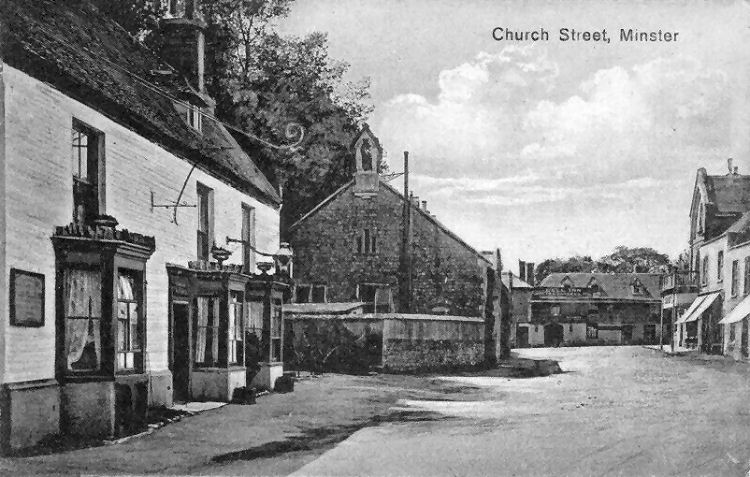
Above postcard, circa 1908. Kindly sent by Rory Kehoe. |

Above postcard, date unknown. |
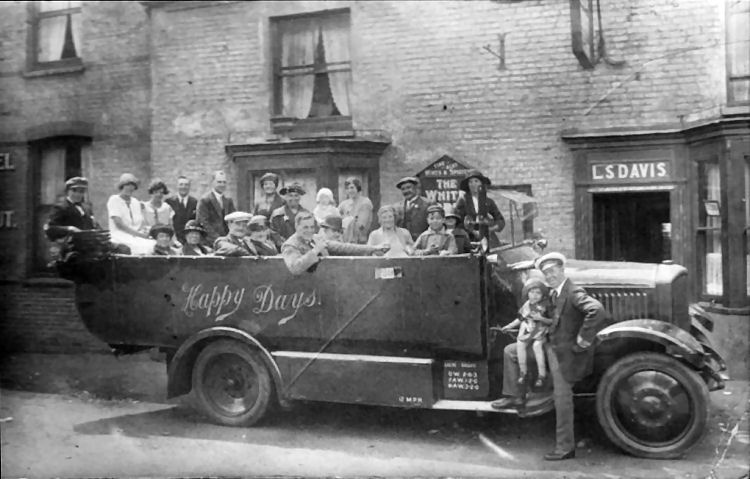
Above photo, circa 1930, kindly sent by Shaun Gardiner. |
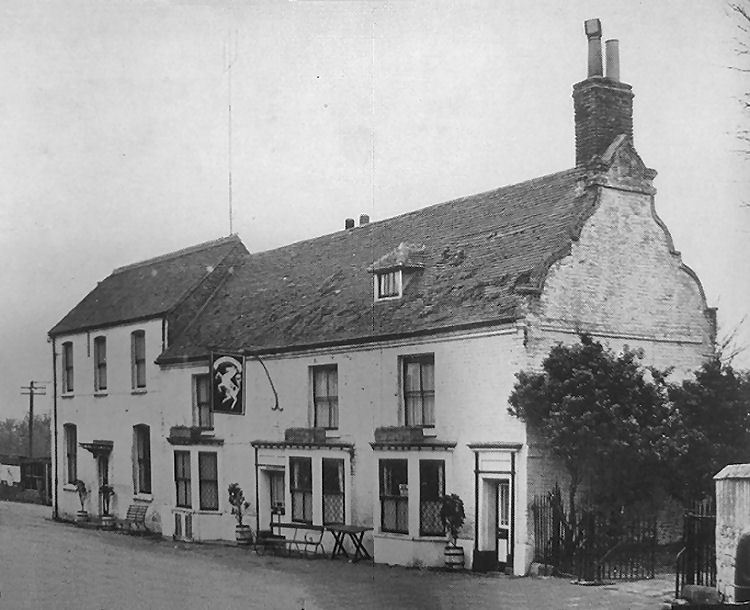
Above photo 1952, kindly sent by Rory Kehoe. |
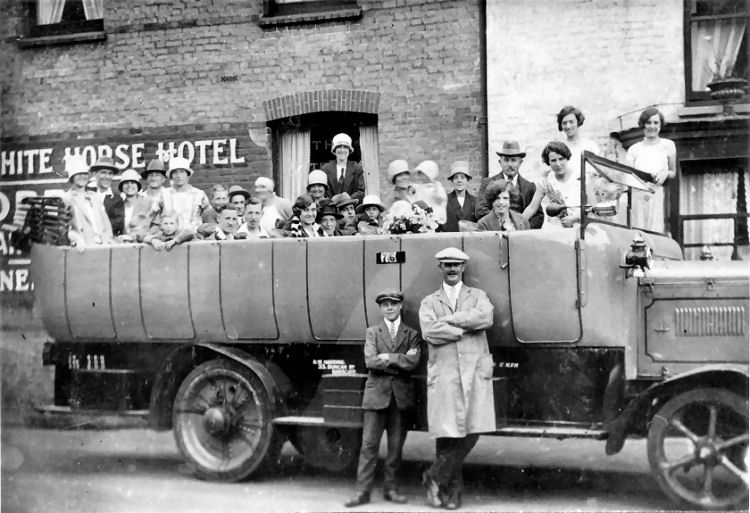
Above photo showing driver, Owen Spain and his eldest son, Ernest who
ended up establishing Spain's Taxi and Car Hire. date unknown. |
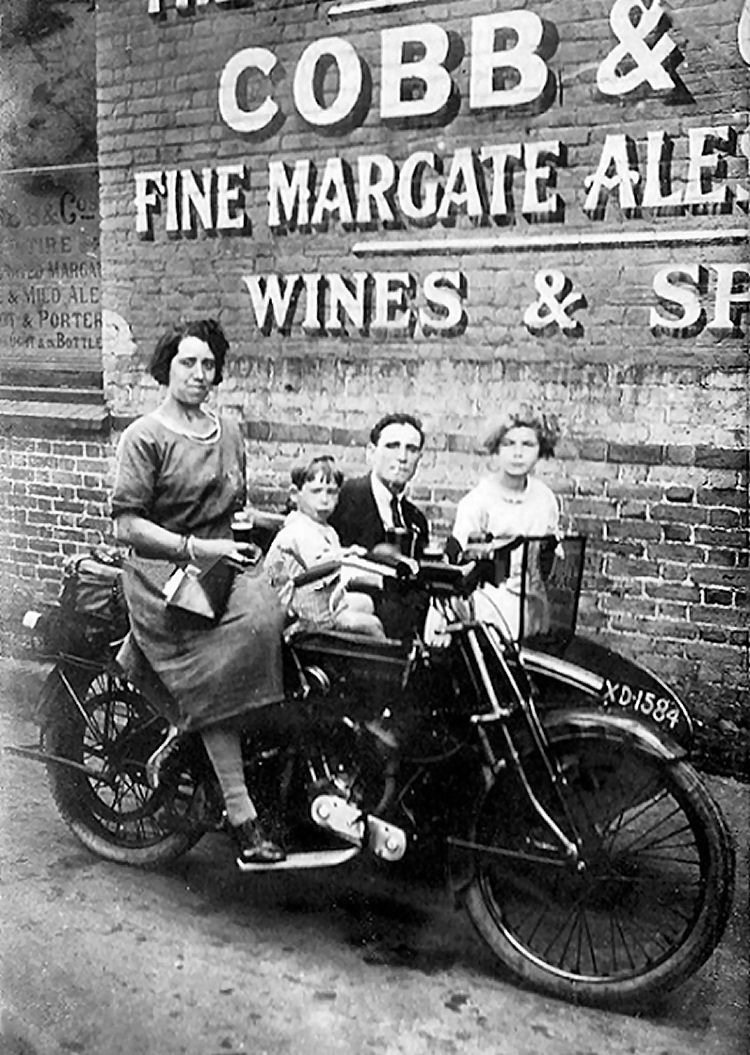
Above photo kindly sent by Rory Kehoe. This was originally one of the
unknown pubs on my list but we believe it is in fact this one. |
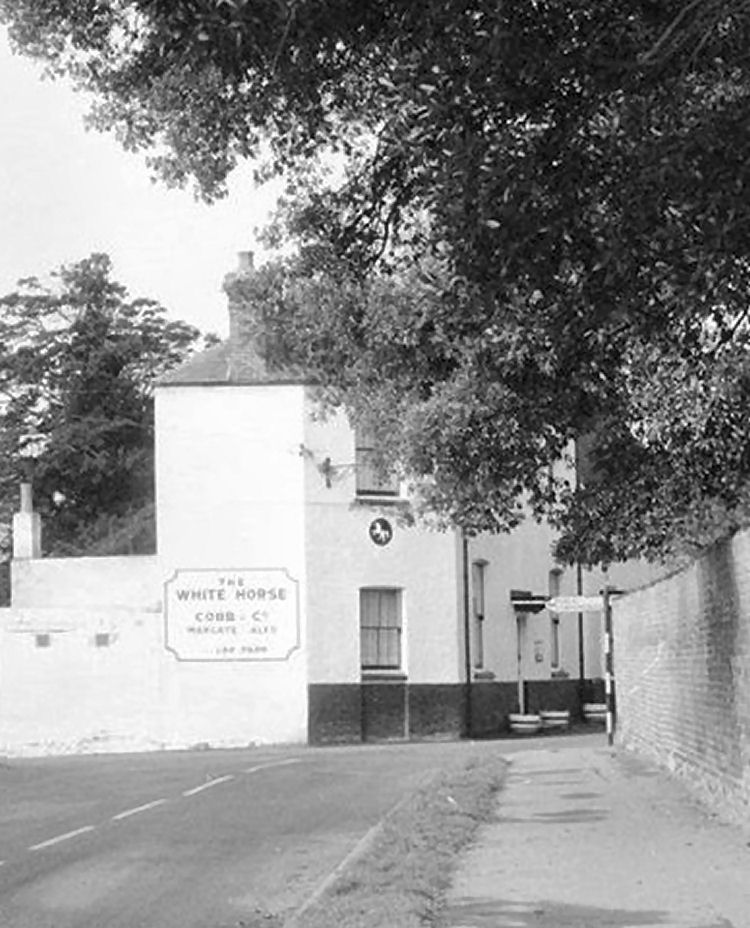
Above photo, circa 1957. Kindly sent by Rory Kehoe. |
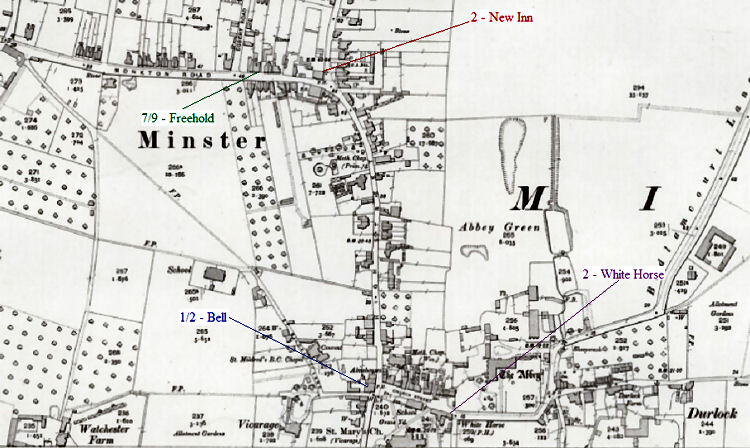
Above map 1905, kindly identified by Rory Kehoe. |
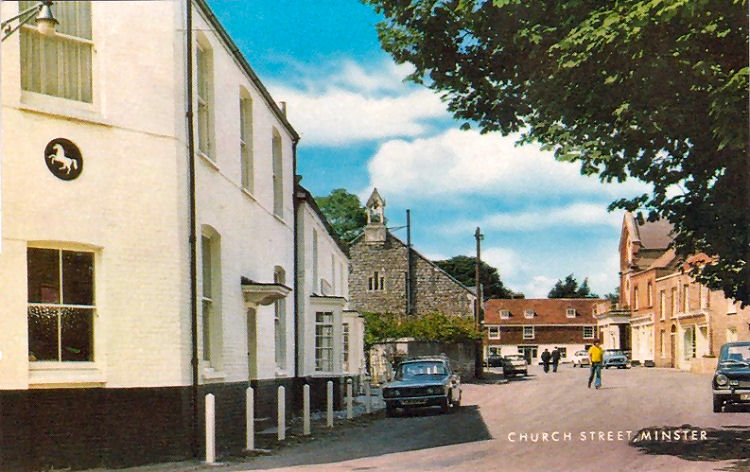
Above postcard, circa 1970, kindly sent by Rory Kehoe. |
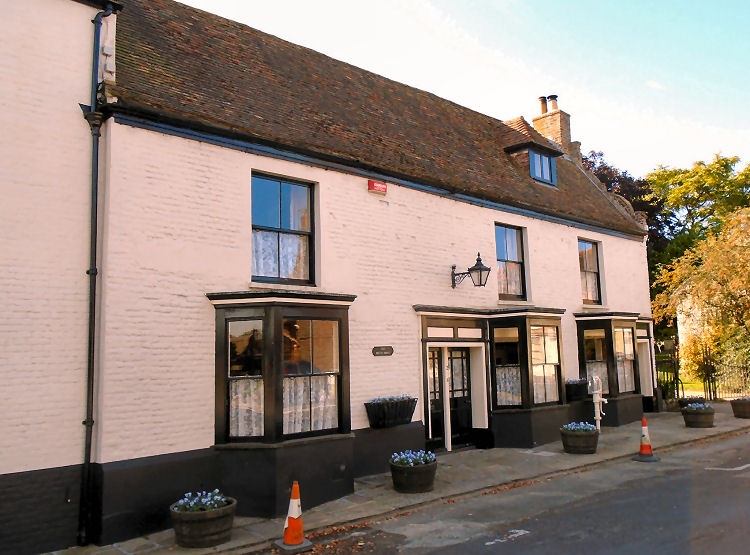
Above photo kindly send by Peter Checksfield, October 2015. |
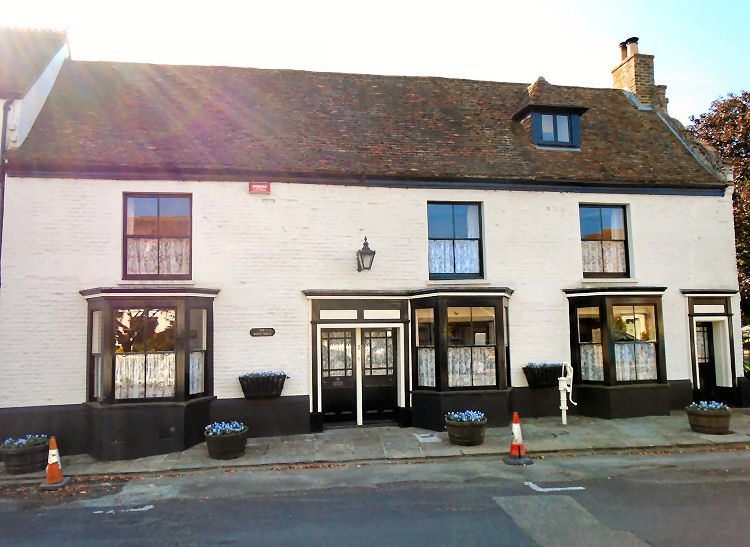
Above photo kindly send by Peter Checksfield, October 2015. |
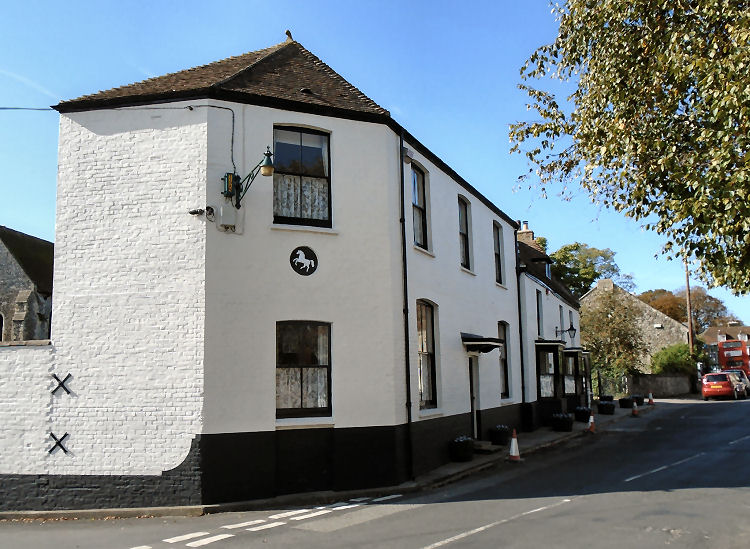
Above photo kindly send by Peter Checksfield, October 2015. |
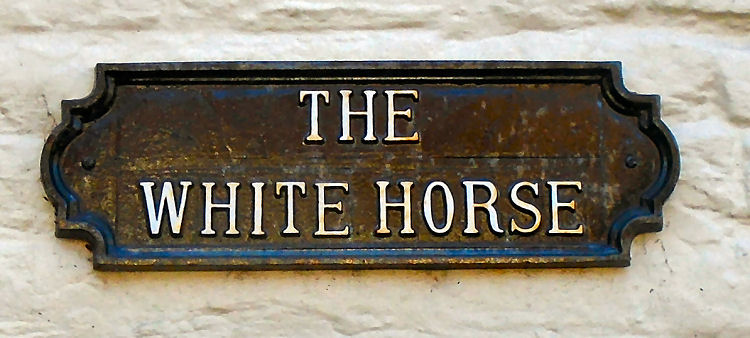
Above photo kindly send by Peter Checksfield, October 2015. |
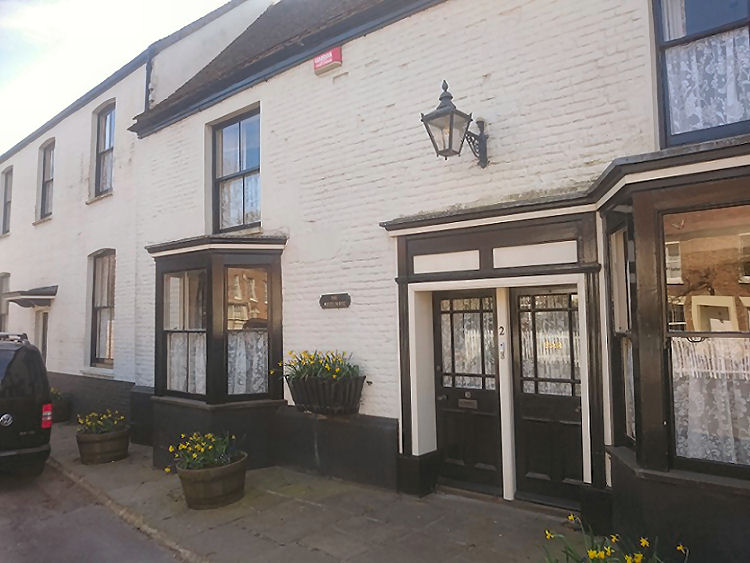
Above photograph, March 2019, kindly taken and sent by Rory Kehoe. |
The "White Horse" ceased trading as a pub in 1970. For many years it was
owned by Cobb & Co. of Margate, who apparently were not related to the
medieval Cobb who owned the inn, and was ‘famed for his knowledge of
horseflesh and his skill in brewing fine ales'. Legend has it that the Black
Prince entrusted to Cobb his black war horse, whilst he rode his white steed
to nearby Minster Abbey to attend Mass.
Cobbs were founded in 1673, but Whitbread took them over early 1968 and
closed the brewery later that year.
Found in Bagshaw Directory 1847.
in 1934 their telephone number was 67.
|
Kentish Chronicle, 3 February, 1829.
Inquest.
On Tuesday an inquest was held by Mr. T. T. Delasaux, Coroner, at
the "White Horse," in the parish of
Minster, Thanet, on view of the body of Stephen Knock, when from the
evidence that appeared, that
from having drank a quantity of ardent spirits he became intoxicated. He was put to bed and proper
attention rendered, but he died the next day.
Verdict - Died from excessive drinking.
|
|
From the Dover Telegraph and Cinque Ports General
Advertiser, Saturday 1 May, 1841.
INQUEST
On Monday last an inquest was held before Mr. De Lasaux, Coroner, at
the "White Horse," in the parish of Minster, Isle of Thanet, on the body
of Samuel Walker, who had hanged himself the preceding evening. The
deceased was a carpenter, and it appeared from the evidence of a
fellow-workman, that he had been employed in the erection of a telegraph
in Kingsdown Wood, but which he had been unable to complete, in
consequence of unfavourable weather, and being very anxious to do so in
order to commence erecting another near Minster Mills; the delay had
caused him great uneasiness, and it is believed so preyed upon his mind
that it eventually compelled him to commit self-destruction.
The Jury returned a verdict of "Temporary Insanity."
|
|
From the Kentish Chronicle, Saturday, 10 September, 1859. Price 1½d.
EFFECTS OF RAILWAY ACCOMMODATION.
It has often been remarked that wherever there is a railway station,
improvements take place sooner or later. Not the least has taken place
at the "White Horse Inn," near our station. The house, in the early part
of the season, was completely renovated, a well laid-out bowling green
has taken the place of pig styes, &c., and a successful fly business has
been established to the house, to the profit and credit of the obliging
landlord, and to the convenience of the public. Two more houses are
now completed on the estate of the National Freehold Land Society. The
style and substantial way they are built are highly creditable. A Choral
Society has been established in the village, under a good auspices. The
meetings are held in the National School-room, and we hope the kindly
spirit evoked between churchmen and Wesleyans will continue, and the
choral society go on harmoniously. |
|
From the Whitstable Times and Herne Bay Herald. 5 October 1867. Price 1d.
Mr. T. W. Collard, the surveyor to the Isle of Thanet Highway Board,
applied that the road leading from the “White Horse Inn," Minster, to
the South-Eastern Railway Station there might become public property
with the consent of the parties concerned — the Marquis of Conyngham,
and the South-Eastern Railway Company.
The application was granted. |
|
From the Thanet Advertiser, Saturday 2 October 1897.
FARM SALES.
Before the County Justices, at the Ramsgate Police Court, on Monday,
Mr. H. Austen, of the "White Horse Inn," Minster, applied for two
occasional licenses for two farm auctions, namely on Sept. 30th, at Hoo
Farm, and on Oct. 6th, at Durlock Farm.
The applications were granted.
|
|
Thanet Advertiser. Saturday 8 January 1898.
Minster. Transfer of Licence.
At a sitting of the County Bench at Ramsgate on Tuesday, before Mr. H.
Wiegall (in the chair,) Capt. L. W. Vaile, and Mr. W. Curling, the
licence of the "White Horse Inn," Minster, formerly held by Mr. H.
Austen, was transferred to Robert Sturt Stokes, late of Margate.
|
|
Thanet Advertiser, Saturday 26 November 1898.
Minster. Wilful damage to a door.
At the Ramsgate County Police Court on Monday, before Mr. H. B. Hammond
(in the chair,) the Mayor of Ramsgate, and Sir Joseph Sebag Montefiore.
James Alexander, of Faversham, was charged with doing wilful damage to a
pane of glass, the property of Thomas Hynes, landlord of the "White
Horse Inn," Minster.
Complainant said that defendant came to his house about 3:30 on Sunday
afternoon, and asked for a glass of ale, stating that he was a traveller
from Faversham. He was served with the ale, and after drinking it he
went out of the house. Just then a friend of witness's drove up in a
trap and defendant held the horse, for which he was afterwards handed
sixpence. This, however, he threw down, and demanding a shilling, and he
then went into the bar and abused the assistant. Witness's wife asked
him to go away, as there was a man dying upstairs (he has since died,)
the defendant then abused her shamefully, and witness, with the help of
two of his men, finally ejected him. Defendant then put his hand through
the glass of the door, and running out into the backyard he picked up a
ginger beer box and deliberately smashed the window right out, also
damaging the frame. The value of the damage at 15s.
I.C. Saunders, station at Minster, said he was sent for by Mr. Hinds and
showed the window. Defendant had gone away, but witness subsequently
discovered him apparently asleep in an alley about 10 minutes walk from
the house. He took him back to the "White Horse," where Mr. Hinds gave
him in charge. Defendant then became very violent, and witness had to
handcuff him before he could get to Broadstairs Police Station.
Defendant had had something to drink, but he was sober. He was very
excited.
Defendant said the window was broken by accident.
The Bench imposed a fine of 8s., (including costs) and 15s, the amount
of damage, in default fourteen days' hard labour; and ordered the
defendant to be detained until he had found the money.
|
|
Thanet Advertiser. Saturday 22 March 1902.
Bona fide Travellers. Minster Publican's Action.
A case of an unusual character occupied the attention of the Ramsgate
County Justice's for a considerable time at the Petty Sessions on
Tuesday, when Frederick Miles (Sarre Court) Ernest Ruff (St. Nicholas,)
Robert Henry Miles (St. Nicholas,) John Hawkins (St. Nicholas,) and
Thomas Charles Williams (St. Nicholas) were summoned, on the information
of Martha Hines, the licensee of the "White Horse Inn," Minster, for
unlawfully and falsely representing themselves to be travellers and
obtaining intoxicating liquors during the hours which said licensed
premises were closed in pursuance of Act of Parliament, on March 12th.
The Magistrates present were Mr. H. B. Hammond (in the chair), Capt. L.
W. Vaile and Mr. J. W. D. Johnson.
Mr. T. T. Whitehead prosecuted, and Dr. F. W. Hardman appeared for
defendants, who pleaded not guilty.
Mr. Whitehead stated the case for the prosecution. He said the
defendants had been attending a smoking concert at the "Bell Inn,"
Minster, on March 12th. The concert terminated about 10 o'clock, which
was the closing hour at Minster, and the defendants then came over to
the "White Horse Inn" and got refreshments on the representation that
they were bona fide travellers. It was true that for the defendants came
from St. Nicholas, while the fourth was from Sarre, and that both places
were outside the 3 mile limit. The Bench had a rather difficult question
to decide. Mr. Whitehead stated that his clients ground for taking these
proceedings was that she was a licensed victualler, and, in view of the
stringent character of the licensing laws, it behoved her to be very
careful in the conduct of her business, in order that she might preserve
a clean slate. He submitted that they worships should be guided in their
decision by the case of "Pen v. Alexander." He contended that persons
we're not bona fide travellers who, merely because they came from
outside the 3 mile limit, went from one house to another to get drink.
In the present case it would be proved that the men had been at the
"Bell" all the evening, and were, therefore, not be in need of liquid
refreshment, and, in asking the Bench to convict, he submitted that they
were not bona fide travellers.
Anna Jeffries, barmaid at the "White Horse," Minster, said on Wednesday
evening, March 12th, the house closed at 10 o'clock, the door being
fastened between a quarter and twenty minutes past ten someone came to
the door and knocked twice. Witness heard a knock and went to the door.
There were four men there. She recognise Frederick Miles and Robert
Miles as members of the party. One of the defendant's, in answer to
witness, said they were travellers from St Nicholas. Witness said: "Are
you sure you are travellers?" And one of the defendants replied:- "Yes.
We are travellers. I shouldn't come unless we were, for I'm a public and
myself." Witness opened the door and let defendants in. Robert Miles
asked for two threes of Scotch whisky and three glasses of ale. Witness
served the drinks, and from the conversation which include, she heard
that they had had a very good evening. They were discussing the songs
they have been listening to. Witness knew that there had been a concert
at the "Bell," which was a short distance from the "White Horse."
Witness called in the barman, Collard, who was in the stable, and
afterwards went to the defendants and told them they were, by their
presents on the premises, causing Mrs. Hinds to run a great risk. She
told them they were not travellers, having been at the "Bell," and
should not have come to the house for refreshments. Defendants did not
reply to witness, but Collard, who was present spoke to Robert Miles and
said that he, being a publican, ought to have known better. Mr. Miles
replied "All right, old man, don't look so white and spiteful" and,
addressing the others, said "Come on, drink up, and let us get out."
They all went out, saying, "Good night to Collard. Witness closed the
door after them.
Cross examined: She fixed the time by looking at the clock in the bar
when she heard the knock. Witness did not know until afterwards that
defendants had put up their trap at the house, and had come to fetch it
away. She knew it before they left, and saw the trap outside as she
closed the door.
Ambrose Collard, barman at the "White Horse," said he occasionally acted
as ostler. On March 12th Ruff brought the trap to the yard about 8 p.m.,
or soon after. Between a quarter and twenty minutes past ten Miss
Jeffries called witness into the bar and asked him to see who the
defendants were. He knew three of them by name and two by site. Witness
said to Mr. Robert Miles (who kept the "Sun," at St. Nicholas,) "It's
past time, and you ought to know better." He replied, "Alright, old
chap, don't look so white and spiteful." Defendants finished their
drinks, and said "Good night." Witness did not answer. He had assisted
Ruff to put the horse in.
Cross examined:- Witness did not say "Good night" because he was annoyed
at the remarks they made to him.
Mrs. Martha Hinds, licensee of the "White Horse," said she was in the
living room when the bar was closed. She heard a knock twice about
10:15, and corroborated the barmaids evidence with respect to the
subsequent conversation.
Cross examined:- She did not hear all the conversation.
John Abraham Tyler, licensee of the "Bell," present on subpoena, said
there was a smoking concert at his house on March 12th, and the
defendants were present. Witness knew the Messrs. Miles by name and the
other three defendants by sight. Four of the defendants were served with
drinks just before they left the "Bell." Witness did not serve Ruff at
the time, but had previously done so in the evening.
Cross examined:- A smoking concert was in connection with the local
Conservative Association.
Dr. Hardman, on behalf of defendant, said that the onus of proving two
things rested with the prosecution firstly, that the representation was
made by the defendant's that they were travellers, secondly, that such
representation was false. There was, he submitted, no evidence given by
the prosecution to show that it was false, and considered that if the
matter was to rest upon a point of Law his friends, Mr. Whitehead, might
have dealt with the case of "Oldham v. Shearsby," one on all fours with
the present case. That was a case in which persons who were undoubtedly
travellers visited a place and went to two inns, at both of which they
were served with refreshment. The magistrates held that the defendant's
were not bona fide travellers when the second inn was visited, but the
refinements in the minds of the justice's was set right by the Queen's
Bench Division. In support of his contention that defendants were
travellers within the meaning of the act, Dr. Hardman mentioned the case
of "Dames v. Bond." In that case and man had come from a distance to
sing at a smoking concert and when he was going back the people at the
end supplied him with a bottle of whiskey. It was held that he was a
traveller, and the circumstance that he had been in the place several
hours did not alter the fact. The only case his (Dr. Hardmans) friend
could quote against him was that of "Penn v. Alexander," but he argued
that that was not a similar one. In the case of "Penn v. Alexander" it
was proved that the defendants walked beyond the 3 mile limit solely for
the purpose of getting beer, and I not, therefore, bonafide travellers.
That was a very useful case, for it laid down an important principle of
law. It had not been proved in the present instance that defendants came
to Minster solely to get drink at the "White Horse." Dr. Hardman
remarked on the curious reason which have been given for these
proceedings being taken viz., that Mrs. Hinds was seeking to protect
herself and ensure that there should be no opposition to a licence. Why
should these five men be held up before the bench simply because Mrs.
Hinds wished to take the precaution of that kind? If she had reported
the matter to the police it would have been a reasonable action, but he
did not think it right that Mrs. Hinds should bring the men up when
there was uncertainty and her solicitor was uncertain that a case should
be made out. Proceding, Dr. Hardman alluded to the allegation that the
defendant's have represented themselves to be travellers, and said the
evidence proved that one of the party made any statement on the subject.
Silent acquiescence did not serve as a statement, and, even if it could
have been proved that representations were made all the members of the
party, he submitted that it had been simply shown that such
representations would have been absolutely true. They asked the Bench to
say that a case for the prosecution had failed.
The Bench retired, and, after deliberating in private for some time,
the Chairman said:- In this case the Bench decide that, as a matter of
Law, no offence has been committed, and, therefore, the case is
dismissed, at the same time they wish to state that Mrs. Hinds was
perfectly justified in bringing the case forward.
Dr. Hardman asked for costs, on the grounds that, although Mrs. Hinds
might have been perfectly justified, she had set the law in motion, and
should pay the expenses of the defendant's.
The chairman:- The Bench cannot grant you the costs in this case.
|
|
Thanet Advertiser, Saturday 10 October 1903.
MINSTER MYSTERY. WOMANS DEAD BODY FOUND IN A DISUSED COTTAGE.
SUSPICIOUS CIRCUMSTANCES. INQUEST OPENED AND ADJOURNED.
A strange affair has occurred in the neighbourhood of Minster. On
Thursday, between the hours of twelve noon and one o'clock, a farm
labourer, named Albert Silvester, of Durlock Farm, an ex-soldier, went
with another man and two women to take shelter in a couple of disused
cottages on a piece of land at Brook, on the east side of the footpath
leading from Minster to Ebbsfleet. It appears that the cottages in
question have been unoccupied for a considerable period, and they had
formed the resting place, and frequently, it is stated, the sleeping
place, of tramps and others. Silvester and his friends went there on
Thursday for the purpose of taking shelter from the rain and having
dinner, and on arrival they
found the doors bolted. It should be stated that the dividing wall
between the two cottages had been penetrated, and it was possible to
pass from one to the other without going outside. Silvester looked
through one of the windows and saw a person lying on the floor,
apparently asleep. A straw hat lay over the face, and part of the
clothing consisted of a man's cloth jacket.
According to details supplied by Silvester afterwards, he did not notice
then whether the person he saw was a man or a woman, and his companions
did not take the trouble to look. He said to them he supposed it was a
man asleep, and they went into the adjoining cottage to have dinner,
Silvester getting in through a broken window and opening a door to admit
the others. After a time Silvester went to his employer, Mr. Pearce, of
Ebbsfleet, to get some money, and on returning to the cottages he was
informed that one of the women of the party had been to the entrance to
the other cottage and had asked whether the person who was supposed to
be asleep required a cup of tea. No answer had been given, and Silvester
went into the apartment with the other man, whose name is Davis. There
they found the body of a woman lying on the floor. She was on her back,
with her face upturned and her left arm outstretched. The straw hat
placed over the face wholly concealed it. Silvester took the hat from
the face, which he found to be covered with blood, while the breast of
the dress was open. He felt the body and found it quite cold. He
replaced the hat and carried the news of his discovery to P.C. Butler,
of the Kent County Constabulary. Sergt. H. W. Turner took the matter in
hand and telephoned to Inspector Fulmer, who was at Broadstairs.
Silvester was directed to return to the scene of his gruesome discovery,
and there be awaited the arrival of the police, upon whose instructions
the body was removed in a conveyance to a shed at the rear of the "White
Horse Inn." Sergt. Turner, the police officer, to whom the matter was
reported by P.C. Butler, secured the services of a local photographer
and called in Dr. Watts, of Minster, before the removal of the body. It
was that of a woman apparently about the age of 47, with black hair, and
was clothed.
In addition to the apparel she had on, there were other garments she was
carrying, and a basket beside her containing iron-holders and other
trifles she had apparently made with a view to selling. The woman was
4ft. 11in. in height. The body showed signs of violent treatment, and
there had been haemorrhage from both ears. It was not possible to tell,
until a post mortem examination had been made, tbe exact nature of the
injuries. There were marks about the face and head, and bruises on other
parts of the body, and appearances gave colour to the belief that the
deceased had been struck by some blunt instrument—probably a boot—and
that her neck had been injured, dislocated if not broken. Death had
probably occurred from 24 to 36 hours previously. In view of the
peculiar circumstances surrounding the case, the county constabulary are
naturally somewhat reticent on the matter, which is now under careful
investigation. There is a pretty general belief that the body is that of
a woman known as Charlotte Turk, who has on several occasions appeared
in the local police courts on charges of drunkenness and disorderly
behaviour, the description of the person named coinciding with that of
the deceased. The woman in question had frequented the district
considerably, and had been in the habit of acting as a hawker.
The inquest, which was opened yesterday (Friday) afternoon, was, after
the evidence of the discovery had been taken, adjourned until Thursday
next, in order that the police might carry on their investigations. Upon
the resumption, medical evidence will be forthcoming, and more light
will doubtless be thrown on what is now undoubtedly a case presenting
some peculiar features.
THE INQUEST.
The inquest, which opened at the "White Horse Inn" yesterday afternoon,
was conducted by Mr. R. M. Mercer, County Coroner. Mr. S. Gerrard
(master of the Union Workhouse), was elected foreman of the jury, which
included several prominent tradesmen of the village and the Rev. J.
Harris (workhouse chaplain). The police officers present included
Inspectors Heard (Deal, and Palmer (Thanet) and Sergt. Turner.
After the jury had been sworn, the Coroner said he was going to ask them
to view the body in the presence of Dr. Watts, because there were
certain injuries about which they might wish to ask questions. The only
evidence he proposed to take that day was evidence of the finding of the
body. There would have to be an adjournment, as the police were not
ready with the other evidence. He would not keep the jury very long.
The body was then viewed.
Albert Silvester, labourer, of Durlock Farm, Minster, deposed that on
the previous day, between twelve and one o’clock, he was in company of
the woman with whom he lived (Alice Foster) and Henry Davis and his
wife. They had just come out of the field and turned into one of the
disused cottages to have dinner out of the rain. Both of the cottages
were empty and anyone could go into them. He was at work at Ebbsfleet
Farm. The cottages were at Brook, in the parish of Minster. Both doors
of the cottages were bolted inside. They could not fasten the doors from
the outside. Witness looked through a window at the end of the cottage
farthest from the footpath and saw someone lying on the floor inside. He
could not see whether it was a man or a woman. He went into the other
cottage, through a window—the glass of which was broken—and unbolted the
door. His companions did not look through the other window, but he said
to them that he supposed someone was asleep there and proposed that they
should go into the next cottage to have dinner. They went in. The two
cottages adjoined, and it was possible to walk from one to the other
without going inside. He and his companions sat down and had their
dinner without going into the cottage where he had seen the person
lying, and afterwards witness went to his employer, Mr. Pearce, at
Ebbsfleet, and obtained 1s. 6d. from him. He returned to the cottages
with the money, and when he got inside, one of the women told him
she had been as far as the entrance to the other cottage, and had asked
if the person there would have a cup of tea, as the weather was cold.
They had not been able to got any answer, and acquainted witness of the
fact. He went into the room with Davis and saw the body lying on the
floor, face upwards. Deceased was dressed and had a straw hat over her
face. It concealed her face wholly. He went up to her, took the hat off,
and noticed the face was covered with blood. The breast of her dress was
undone. He felt the body and found it quite cold. He said he would give
information to the police and put the hat back as he had found it.
Deceased was wearing a man's jacket, and the straw hat was similar to a
man’s. Her dress was disarranged. The windows of the cottages were very
dirty, and he had not been able to see distinctly through them. He told
a police-constable what he had seen, and afterwards a conveyance was
brought to the cottages. Witness, after informing the police, had been
sent back to the cottage to await their arrival and see that the body
was not moved. It was then in exactly the same position as when he found
it. When he came away the first time the others left also, the women
being afraid to stay. There was an old tin, like a child’s footpath,
near deceased's head.
By the jury:- He had not been in the cottage before during that morning,
nor on the day previous. He had not visited the place for about a
fortnight. He did not recognise the deceased. She was a stranger to him.
He might have seen her without knowing her. The women had not seen the
deceased; they would not look at her.
On the suggestion of Inspector Palmer the inquest was adjourned until
Thursday next, at 3 p.m., it being stated that the police would have to
get the assistance of Detective-Sergt. Fowle, from Maidstone, to help
them in their investigation.
A juryman asked whether ho could not be excused from attendance as he
had business to do in London, but the Coroner said he was very sorry he
could not accede to the request.
|
|
Thanet Advertiser, 17 October 1903.
MINSTER MYSTERY. CONCLUSION OF THE INQUEST.
VERDICT OF “ WILFUL MURDER.”
THE IDENTITY OF DECEASED.— CONFLICTING EVIDENCE.
At the "White Horse Inn," Minster, on Thursday afternoon, Mr. B. M.
Mercer, County Coroner, and a jury of which Mr. S. Gerrard was foreman,
continued their investigation into the circumstances surrounding the
death of a woman whose body was found, with injuries to the head, in a
lonely disused cottage at Brook, a short distance from Minster, on
Thursday of last week. The details of the discovery ware given at length
in our previous issue. The inquest was concluded on Thursday. Inspector
Palmer (Thanet), Detective-Sergt. Fowle, Sergt. Turner, and a
detective-constable of the Kent County Constabulary were present.
Before evidence was taken the Coroner asked if any arrest had been made
in reference to the affair.
Inspector Palmer:- No, sir.
The evidence of Albert Silvester, taken at the previous sitting, was
read over.
Inspector Palmer asked witness questions about his movements on Monday,
Tuesday, and Wednesday of last week. In reply witness said he was not
working on Tuesday, as he had told the sergeant.
By a juryman:- Witness did not see a candle about the place in which the
body was discovered.
Inspector Palmer:- You did not touch the body except to put the hat
back.
Witness:- No, sir. I only just felt it.
Bertram Gardener, living at High-street, Minster, said he took the
photographs produced at the request of Sergeant Turner, on Thursday and
Friday of last week. (The photographs in question were of the deceased
lying in the cottage). Witness completed the process to the printing.
Henry Davis, of no fixed abode, said he was a labourer and had been
working in the parish of Minster for ten years off and on. He had been
in the parish all the summer. On October 8th he was with Silvester and
the two women. It was raining hard, and they went into the
cottage to have their meal there. They remained there about an hour or
an hour and a half. Witness first saw the deceased when he and Silvester
went in together. Silvester had been away and had returned. Anyone could
pass from one cottage to the other through a door there. Silvester said
he thought a man and a woman were lying in the room. After Silvester had
gone, one of the women called out to the person in the next cottage
"Will you have a cup of tea, missus. It’ll warm you." The women did not
go into the other cottage. When Silvester came back he and witness went
into the room to see whether the person was asleep. When inside they saw
the deceased, whom they took to be a man, lying on the floor. Witness
did not touch deceased. Silvester took the hat from her face and found
the woman was dead. There appeared to be bruises on the face. He did not
see any blood. Silvester said "I shall go and report it to the police
constable," and they all came out together. Witness went to Durlock. He
did not return to the cottage afterwards. He had been working that day
in a wertzel field on the other side of the line, about half a mile
away. Witness had not been in the cottages for about a month. He had
known a woman named Turk, but he could not say that deceased was that
woman. He could not recognise her. Witness had not been working the day
before, owing to the rain. He did not touch the body nor any of the
things in the room.
By the jury:- The hat was over the face, but he could not say whether it
had been put there, the clothes were all over the place. He had never
met the deceased.
By Inspector Palmer:- Witness did not take sufficient notice when he
first saw the body to be able to say whether it was that of Charlotte
Turk. She generally carried an arm basket.
The Coroner asked if the deceased had a basket.
Inspector Palmer:- She had a small basket, sir.
Witness said he did not think, from the photograph, that deceased was
Charlotte Turk, and, in reply to the inspector, stated that he last saw
Charlotte Turk about three years ago. She was then with a man whom
witness knew as her husband. She did not walk lame. Witness had not seen
the husband for two or three years.
By the Coroner:- The doors of both cottages were bolted, and Silvester
put his hand through a window, pulled the catch down, opened the window,
got in, and unbolted the door. Witness did not notice a window at the
back of the cottage. Whenever witness had been there before he always
found the door open. It was a common thing for people to "doss" there.
He had slept there himself a month previously. He had cooked food
downstairs.
By Inspector Palmer:- He did not wonder, when he saw the body, whether
deceased had met her death by violence. He came up the street on Tuesday
night. He could not say what
public-houses he went into that night. He did not see deceased on that
evening.
Silvester, recalled, said there was a window opening on the back, on the
ground floor, large enough for a man to get through. He could have
locked the front door and got out of the window at the back.
By Inspector Palmer:- He did not take much notice of the state of the
face when he took the hat off. He did not have any conversation with
Davis, as they were returning to Durlock, concerning the affair.
Alice Foster, of no fixed abode, wife of David Foster, said she had been
at Minster three weeks, and during that time had been living with
Silvester. On October 8th she had been working in a wurtzel field with
Silvester, Davis, and his wife. They left the field owing to the rain,
soon after eleven, and went to Brook Cottages, Silvester looked through
a window and said. "There is someone in there lying down." One of the
men then opened a window of the other cottage, got in and opened the
door, and they all went in. They scraped some wood together, lit a fire,
and made some tea. They sat round the fire and dried their clothes.
After they had had their food Silvester left to go to Mr. Pearce, to get
some money. Witness said to Alice Davis, "That woman must be cold,"
adding "Perhaps she’d like a cup of tea." They then went to the door
between the cottages and called out "Mate, will you have a cup of tea?"
They looked in and saw a person lying down. There was no answer, and
they came away. Witness said, "We'll wait until Albert Silvester comes
back." They were frightened. They told Davis about it, and he said they
would wait until Silvester came back. Silvester came in soon afterwards,
and they told him they had called to the woman and had got no answer.
Silvester said, "I'll go and see if I can rouse her," and the two men
went into the room. They came back in a very few minutes and said the
woman was dead. Witness and the others put on their things at once and
went out. They came straight down to the street together. Witness had
not known anyone of the name of Turk, and did not recognise the
deceased. On Monday, Tuesday, and Wednesday, before the discovery, none
of the four were at work.
By Inspector Palmer:- She had been with Silvester twelve months. She had
had conversation with Davis and Silvester, and they said they would like
to know who had done the murder.
Alice Davis, wife of Henry Davis, gave evidence similar to that of the
previous witness, and said she had known Charlotte Turk. Witness had not
seen her for three years. To witness's knowledge that woman was not
lame. Witness had been near the cottage the previous day. Alice Foster
would not go into the room where the deceased was because she was
nervous.
By Inspector Palmer:- Witness had a green painted perambulator before
she came to Minster. She sold it to Mr. Craycraft at Ramsgate. She had
bought a new one.
Elizabeth Kelly, an inmate of Minster Workhouse, said her husband, who
had been a hawker, was also an inmate. Witness knew Charlotte Turk. She
saw the body on Friday last, at the "White Horse," and identified it, by
a number of the teeth being missing, as that of Charlotte Turk. Witness
first knew the woman at Ash three or four years ago. She used to go out
with a hawking basket. When at Ash witness lodged at the "Good Intent,"
and remembered one occasion when Charlotte Turk came into the bar. The
lower part of her face was covered with blood, and she showed witness
that her teeth had been knocked out. Nine teeth were gone. She said Turk
had knocked them out. Turk was with her on that occasion, and asked her
to have something to eat. She did not want anything. Since then witness
had only seen Charlotte Turk once, and that was on Wednesday, October
7th, at the "White Horse," between four and five in the afternoon. She
was in the bar with another woman, having some beer. Witness was in the
bar when Charlotte Turk entered with the woman. A man was outside with a
perambulator. Witness left Charlotte Turk drinking the beer, and went a
cross the street to Mr. Chase's. On returning about ten minutes later
Charlotte Turk and the others had gone. Witness did not notice what was
in the perambulator. The man she saw was something over thirty years of
age, she supposed, but she could not identify him. Witness did not speak
at all to Charlotte Turk or her companion. She did not bear any
conversation between the two. Witness and Turk did not nod to each
other, because Charlotte Turk was so insulting when in drink. Witness
also identified the deceased by a mole on her chin. Witness was quite
sure that the deceased was Charlotte Turk, but she had not noticed that
that woman had a lot of hair upon the chin.
In reply to Inspector Palmer, witness said she on one occasion had a
little "set-to" with Charlotte Turk, who had insulted her.
The Coroner pointed out the growth of hair on the chin shown by the
photograph.
By a juror:- Charlotte Turk had a little basket with her when witness
saw her in the bar. The basket was similar to the one produced. The
woman was wearing a dirty white straw hat, with a black band, and a sort
of cape. Witness did not take particular notice, but she recognised the
hat and fur cape produced.
In reply to the Coroner, Mr. Kenyan, landlord of the "White Horse," said
he did not remember the two women spoken of by the witness Kelly being
served by him.
James Henry Austen, of Durlock, Minster, gardener, said he had seen the
photo of the body of deceased. He saw her about eight o'clock on the
morning of October 6th, at Durlock. She was then sitting alongside the
yard gates, and said to witness, "I beat you this morning; I have had my
breakfast." Witness said he was going to have his. He took rather
particular notice of the woman, because she spoke pleasantly and had
rather a wrinkled face. Deceased was there when he returned, about
half-past eight. Witness identified the deceased’s hat, cape, basket,
and tea can.
By Inspector Palmer:- Witness knew Charlotte Turk, but the photograph
was not here.
It was stated by the police that a warder and the matron of Canterbury
Gaol were certain that the body was that of Charlotte Turk.
The Coroner:- But I have not got them here.
Inspector Palmer said that Mr. Tyler, landlord of the "Bell," a member
of the jury, also recognised her.
P.S. Henry William Turner, of the K.C.C., stationed at Minster, said
that on August 8th, shortly after two o’clock, he received information
from P.C. Butler that there was the dead body of a man lying in a
disused cottage at Brook, Minster. The constable had not been there.
Witness at once proceeded with the constable to the cottage, and there
found Silvester standing outside. He had been sent back by the
constable. Silvester got through a window, unbolted one of the doors,
and led the way, through an opening in the partition, into the front
downstairs room of one of the cottages. Witness there saw the body of a
woman, lying on its back, with the head to the south wall. Silvester
thought it was a man. Witness removed the straw hat from the face.
Silvester told witness he had never moved the hat, but that he had only
felt the chest. Seeing indications of foul play, witness left the body
in charge of the constable and secured the services of a local
photographer. The body lay on straw litter on the floor. The only blood
marks in the room were close to the head. Blood had been running from
the ears, and was smeared over the face. Beside the body were deceased’s
dress, her own jacket, two pairs of boots, and a tea can. The soil
around the cottages was hard and overgrown with weeds. Footprints could
not be discerned. Witness searched the house for any blunt instruments,
but could find none.
By Inspector Palmer:- The breast of deceased's dress appeared to have
been torn open and her clothes disarranged. In witness's opinion there
had been a struggle. He caused the body to be removed after Dr. Watts
bad been called in.
Dr. Alexander Minter Watts, Durlock House, Minster, submitted a report,
in which he said that on October 8th he was called to see a dead body
lying in a disused cottage at Brook. He arrived about 4.30 p.m., and
found the body of a woman lying flat on the back, on the floor of one of
the rooms. Death had occurred about twenty-four hours previously.
The Coroner:- What signs did you judge from.
The doctor:- I judged from the rigidity, the post mortem staining, and
the coldness.
Continuing, witness said the forehead was much bruised, and blood had
been escaping from both ears, and there was blood about the nostrils.
The deceased was apparently about the age of 45 years and 5ft in height.
The body was well nourished, and marks upon the right arm shewed that
she had recently been vaccinated. There was a small
abrasion on the bridge of the nose and a bruise on the right side of the
lower jaw, two and a quarter inches in length. The external marks of
violence also included slight abrasions on both hands and knees, and a
wound on the right ear. The face was much swollen and discoloured. On
the instructions of the Coroner, witness made a post mortem examination.
There was a fracture of the base of the skull, and he came to the
conclusion that death was due to coma caused by such fracture.
In reply to questions by the Coroner, the doctor said the fracture was
from the region of the right ear and did not extend across the vault.
The line of fracture did not rise above a line drawn from one ear to the
other.
The Coroner:- How would such injury be inflicted?
The doctor:- I should say by a direct blow.
In reply to the Coroner, the doctor said the skull in this case was
unusually thin.
The Coroner drew attention to the battered straw hat and asked if a blow
on the top of the head would cause the fracture described.
The doctor said in his opinion the fracture was caused by the blow on
the ear. He did not think the injury could have been caused by a blow
from a heavy hand. The wound on the lower part of the ear almost
corresponded with the fracture, and in his opinion the one followed the
other. He thought the wound was inflicted by a blunt instrument, such as
a boot. Deceased might have been kicked. The wound was dirty and the ear
looked as if it had been split open by a blunt instrument used with
force. Such a blow would render deceased unconscious but would not kill
immediately.
The Coroner:- Are you convinced that she met her death by a violent
blow?
The doctor:- I think she must have been knocked down. I do not think she
fell in the ordinary way. She might have produced such a fracture had
she fallen from a height of thirty or forty feet.
By Inspector Palmer:- There was a bunion on the foot, but witness did
not think it would be sufficient to cause her to walk lame.
The Coroner said that in the photograph of the deceased there was a very
prominent bunion, but the size of that, he supposed, had been
exaggerated by the proximity of the feet to the camera.
William Turk, of no fixed abode, said be was a labourer, and had lately
been working at Wingham. He had been there five or six weeks. He did not
see the body of the deceased, but from the photograph he did not think
it was that of Charlotte Turk. Her maiden name was Charlotte Elgar, and
he believed she belonged to Portsmouth.
Witness last saw her two years ago last April, at Canterbury. She had
been in Canterbury Gaol and came to the house at which he was lodging
for some breakfast. Witness went to work on that occasion and did not
see deceased afterwards. Witness was not at Minster on October 7th.
Charlotte Turk had false teeth. What the woman Kelly had said about
witness knocking the teeth out was untrue. He did not think deceased was
Charlotte Turk.
Mr. Pearce, of Ebbsfleet Farm, in answer to the Coroner, said that the
woman in the photograph was similar to Charlotte Turk, who had worked
upon his farm.
It was stated by the police that Mr. Tyler, landlord of the "Bell Inn,"
Minster, and other jurymen knew Charlotte Turk.
Mr. Tyler explained that he and other members of the jury were strongly
of opinion that the body was that of the woman Turk, but they could not
actually swear to its identity.
The Coroner summed up briefly, referring to the conflicting nature of
the evidence of identity, and to the difficulty of the jury in
ascertaining whether the deceased was Charlotte Turk or not. He advised
them that they could, if the evidence was insufficient, regard the body
as that of a woman unknown.
VERDICT: "WILFUL MURDER."
The room was cleared, and after deliberating for some time in private
the jury returned a verdict of "Wilful Murder against some person or
persons unknown." They also found that there was not sufficient evidence
to shew who the deceased was.
|
|
Dover Express, Friday 3 August 1906.
SANDWICH. MISTAKEN IDENTITY OF A MURDERED WOMAN.
A startling development of a mysterious murder case has created
considerable stir in the Sandwich District. Three years ago a woman was
found brutally murdered in a lonely outbuilding near Minster, and was
fully identified as Charlotte Turk, who was known to many as a
fruit-picker and a field worker. The most extensive inquiries by the
police failed to discover the culprit, and the jury returned a verdict
of wilful murder against some person or persons unknown. In the name of
Charlotte Turk the murdered woman was buried at Minster. The crime was
almost forgotten, when, on Saturday, Charlotte Turk came into the
Minster district for field work. The woman’s appearance amongst all who
had known her was quite dramatic. After questioning her, the police were
completely satisfied that the woman is Charlotte Turk, who was supposed
to have been interred three years ago.
|
|
Thanet Advertiser, Friday 8 February 1929.
Minster. Shaking the Oak.
The "White Horse Inn," (Minster) Darts Club played a profitable
visit to the "Royal Oak," Upstreet, on Wednesday, when they won 6
out of the 11 games played.
|
|
Thanet Advertiser, Friday 21 August 1931.
Death in Bath. Tragic Discovery at Minster Inn.
A tragic discovery was made at the "White Horse Inn," Minster, on
Wednesday, when Mr. Stephen Philip Blogg returned from a short walk and
found his wife, Mrs. Alice Mary Blogg, dead in the bath.
Mr. and Mrs. Blogg assisted their son-in-law, Mr. Percy Newnham, the
licensee of the inn, and their daughter, Mrs. Newnham, in running the
business, which they acquired as recently as last December. A poignant
feature of the tragedy was that, while Mr. Newnham was away visiting his
wife, who was staying with her sister, Mrs. Cole, at Yalding, Mr. and
Mrs. Blogg were preparing for a visit from another daughter and their
husband, from Portsmouth, who were to spend and a holiday at the "White
Horse."
The deceased lady, who was 58 years of age, had had a busy day on
Wednesday for paying for a daughter and son-in-law the arrival, and in
the afternoon she advised Mr. Blogg to go for a walk while she completed
her toilet and prepared the tea. Mr. Blogg went out about 4:30 and
return shortly after 5. The kettle was on 40, and the gas oven was a
light in the kitchen in readiness for cooking a joint for the evening
meal. As he did not see his wife he came to the conclusion she was in
the bathroom. Receiving no answer to his call, he entered, only to find
her in a crouched and collapsed position at the bottom of the bath, with
her head leaning forward over her knees.
Sergeant Jacobs, of the West County Constabulary, was called, and
artificial respiration was applied by both the police sergeant and by
the deceased's husband, but without avail.
A Tragic Homecoming.
The deceased's lady's daughter Maisie, who at the time was on her way to
stay at Minster, had to be met at the station and informed of the tragic
death of her mother, and the licensee was quickly recalled from Yalding.
A post-mortem examination was carried out at Hill House on Thursday
afternoon, and an inquest was to have been conducted at the "White Horse
Inn" by the deputy coroner for East Kent (Mr. A. K. Mowll) this
afternoon.
Mrs. Blogg came to Minster from Haywards Heath, Sussex, last December,
when her son-in-law took over the "White Horse Inn" from Mr. and Mrs. L.
Davies. Although she had only been in the village of short time, she
quickly made friends with the residents. Of a cheery disposition, Mrs.
Blogg enjoyed fairly good health, and was in high spirits on Wednesday.
The good feeling that exists between the licences in the district was
shown by the kindly action of Mrs. H. Rookledge, wife of the licensee of
the "New Inn," who went to Mr. Blogg's assistance immediately on hearing
of the tragedy and assisted in both the household duties and in the
business.
|
|
Thanet Advertiser, Friday 22 May 1936.
MINSTER HAS MORE LUCK.
Extensions until 11 p.m. on Whit-Saturday and 11:30 p.m. on Whit-Monday
at the "Bell Inn," the "Freehold Inn," the "New Inn" and the "White
Horse," Minster, and the "New Inn," Monkton, were granted by Ramsgate
County magistrates on Tuesday.
|
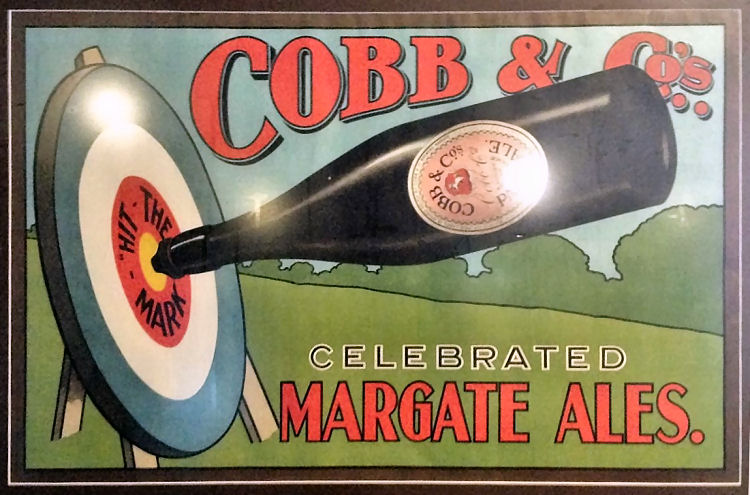
The above 1920s sign used to be inside the pub, so Rory Kehoe says.
|
|
From the East Kent Times and Mail, 10 November 1970.
Goodbye "White Horse Inn."
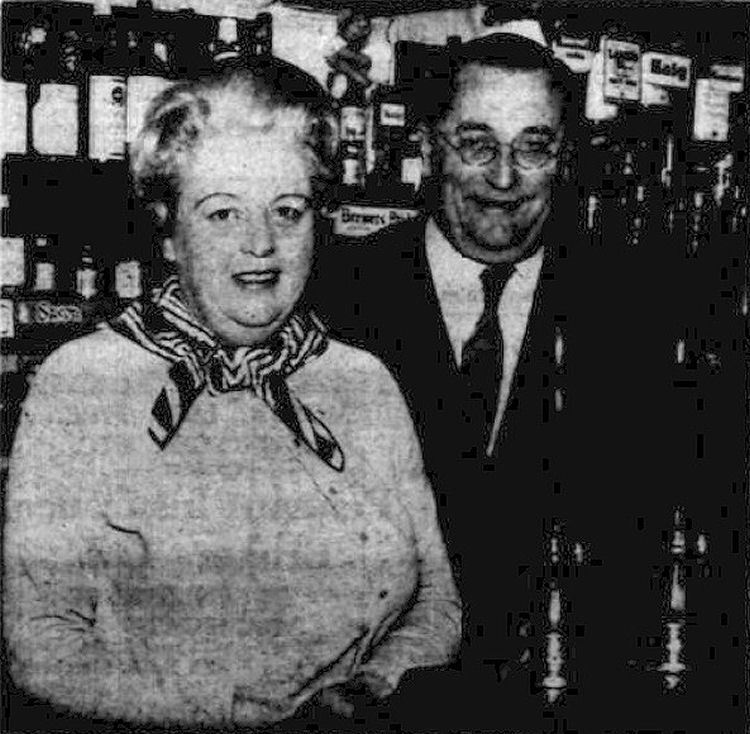
REGULARS of one of Kent's oldest and most picturesque pubs, the
"White Horse Inn," at Minster, will be saying good-bye to the present
licensees when they leave the village next month.
Mr. and Mrs. Tony Aldington (pictured here) will be leaving the pub
during the first week in December and will move to their new
establishment, the "Mermaid," at Bishopsbourne, straight away.
In their place will be the new landlord and his lady, Mr. and Mrs.
Bob Lucas. Mr. Lucas is at present the Broadstairs District Fire Officer
and retires on December 4 after years service.
For Mr. Lucas it will be his first venture in running a public-house,
but for Tony and his wife Daphne, the "Mermaid" will be like a trip into
the past.
Being a landlord has come easy for Tony, who has been in the
business' most of his life. His parents were also licensees, and at one
time owned a pub called the "Mermaid," but that was at Rye in Sussex.
Although Minster is a small village, Tony, 56 says that Bishopsbourne
is even smaller. |
After closing it was an antiques shop for a time but is now (2018) a private residence.
LICENSEE LIST
GISBY John 1740-

GOULDER/GOLGER Edward 1841-58+ (age 44 in 1851 ) )

CHAPMAN George 1867-74+

PHILLIPS George 1881+
SHEERMAN James 1882+
BEERLING Llewellyn 1890-91+ (age 27 in 1891 ) )
AUSTEN H Mr 1897-Jan/98
STOLES Robert Sturt Jan/1898+
HINDS/HYNES Thomas Fisher 1898-99+

HINDS Martha Mrs 1901-03+ 
KENYON Henry 1907+
BOWYER Charles W 1911+ (age 46 in 1911 ) )
FAGG Henry T 1913+
READ Thomas Arthur 1918+
GAFFEE Albert T 1922+
DAVIES Leonard S 1929-34
GOSDEN William E 1934+

BAKER Walter William 1936+
BROWN Ernest Henry 1938-39+
BUTCHER G E 1951-53+
WITHERS Albert George
 1955-57+
1955-57+
ALDINGTON Tony to Dec/1970

https://pubwiki.co.uk/WhiteHorse.shtml
http://www.closedpubs.co.uk/whitehorse.html
 From Wingham Division Ale Licences 1740 Ref: KAO - QRLV 3/1 From Wingham Division Ale Licences 1740 Ref: KAO - QRLV 3/1
 From
Bagshaw Directory 1847 From
Bagshaw Directory 1847
 From the Post Office Directory 1874 From the Post Office Directory 1874
 From
the Kelly's Directory 1899 From
the Kelly's Directory 1899
 From the Kelly's Directory 1903 From the Kelly's Directory 1903
 From
the Kelly's Directory 1934 From
the Kelly's Directory 1934
 Census Census
|















